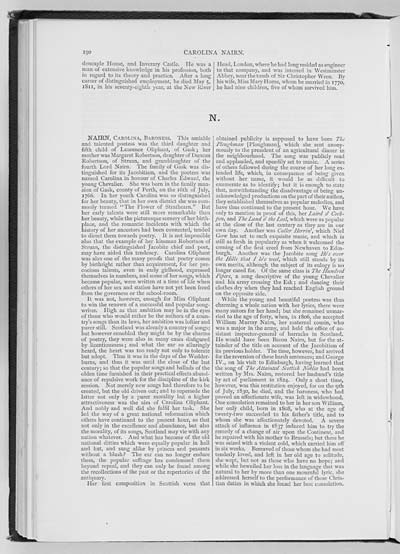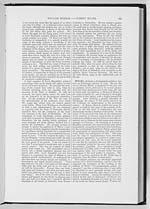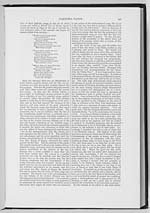190
dencaple House, and Inverary Castle. He was a
man of extensive knowledge in his profession, both
in regard to its theory and practice. After a long
career of distinguished employment, he died May 5,
1811, in his seventy-eighth year, at the New River
Head, London, where he had long resided as engineer
to that company, and was interred in Westminster
Abbey, near the tomb of Sir Christopher Wren. By
his wife, Miss Mary Home, whom he married in 1770,
he had nine children, five of whom survived him.
N.
NAIRN", CAROLINA, BARONESS. This amiable
and talented poetess was the third daughter and
fifth child of Laurence Oliphant, of Gask; her
mother was Margaret Robertson, daughter of Duncan
Robertson, of Struan, and granddaughter of the
fourth Lord Nairn. The family of Gask was dis-
tinguished for its Jacobitism, and the poetess was
named Carolina in honour of Charles Edward, the
young Chevalier. She was born in the family man-
sion of Gask, county of Perth, on the 16th of July,
1766. In her youth Carolina was so distinguished
for her beauty, that in her own district she was com-
monly termed "The Flower of Strathearn." But
her early talents were still more remarkable than
her beauty, while the picturesque scenery of her birth-
place, and the romantic incidents with which the
history of her ancestors had been connected, tended
to direct them towards poetry. It is not impossible
also that the example of her kinsman Robertson of
Struan, the distinguished Jacobite chief and poet,
may have aided this tendency. Carolina Oliphant
was also one of the many proofs that poetry comes
by birthright rather than acquirement, for her pre-
cocious talents, even in early girlhood, expressed
themselves in numbers, and some of her songs, which
became popular, were written at a time of life when
others of her sex and station have not yet been freed
from the governess or the school-room.
It was not, however, enough for Miss Oliphant
to win the renown of a successful and popular song-
writer. High as that ambition may be in the eyes
of those who would rather be the authors of a coun-
try's songs than its laws, her ambition was loftier and
purer still. Scotland was already a country of songs;
but however ennobled they might be by the charms
of poetry, they were also in many cases disfigured
by licentiousness; and what the ear so alluringly
heard, the heart was too ready not only to tolerate
but adopt. Thus it was in the days of the Wedder-
burns, and thus it was until the close of the last
century; so that the popular songs and ballads of the
olden time furnished in their practical effects abund-
ance of repulsive work for the discipline of the kirk
session. Not merely new songs had therefore to be
created, but the old driven out; and to supersede the
latter not only by a purer morality but a higher
attractiveness was the aim of Carolina Oliphant.
And nobly and well did she fulfil her task. She
led the way of a great national reformation which
others have continued to the present hour, so that
not only in the excellence and abundance, but also
the morality, of its songs, Scotland may vie with any
nation whatever. And what has become of the old
national ditties which were equally popular in hall
and hut, and sung alike by princes and peasants
without a blush? The ear can no longer endure
them, the popular suffrage has condemned them
beyond repeal, and they can only be found among
the recollections of the past or the repertories of the
antiquary.
Her first composition in Scottish verse that
[ obtained publicity is supposed to have been The
Pleughman [Ploughman], which she sent anony-
mously to the president of an agricultural dinner in
the neighbourhood. The song was publicly read
and applauded, and speedily set to music. A series
of others followed during the course of her long ex-
tended life, which, in consequence of being given
without her name, it would be as difficult to
enumerate as to identify; but it is enough to state
that, notwithstanding the disadvantage of being un-
acknowledged productions on the part of their author,
they established themselves as popular melodies, and
have thus continued to the present hour. We have
only to mention in proof of this, her Laird o' Cock-
pen, and The Land o' the Leal, which were as popular
at the close of the last century as they are in our
own day. Another was Caller Herrin', which Niel
Gow has set to such exquisite music, and which is
still as fresh in popularity as when it welcomed the
coming of the first creel from Newhaven to Edin-
burgh. Another was the Jacobite song He's ower
the Hills that I lo'e weel, which still stands by its
own merits, although the subject of its eulogy is no
longer cared for. Of the same class is The Hundred
Pipers, a song descriptive of the young Chevalier
and his army crossing the Esk; and dancing their
clothes dry when they had reached English ground
on the opposite side.
While the young and beautiful poetess was thus
charming a whole nation with her lyrics, there were
many suitors for her hand; but she remained unmar-
ried to the age of forty, when, in 1806, she accepted
William Murray Nairn, her maternal cousin, who
was a major in the army, and held the office of as-
sistant inspector-general of barracks in Scotland.
He would have been Baron Nairn, but for the at-
tainder of the title on account of the Jacobitism of
its previous holder. The time, however, had arrived
for the reversion of these harsh sentences; and George
IV., on his visit to Edinburgh, having learned that
the song of The Attainted Scottish Nobles had been
written by Mrs. Nairn, restored her husband's title
by act of parliament in 1824. Only a short time,
however, was this restitution enjoyed, for on the 9th
of July, 1830, he died, and the baroness, who had
proved an affectionate wife, was left in widowhood.
One consolation remained to her in her son William,
her only child, born in 1808, who at the age of
twenty-two succeeded to his father's title, and to
whom she was affectionately devoted. A severe
attack of influenza in 1837 induced him to try the
remedy of a change of air upon the Continent, and
he repaired with his mother to Brussels; but there he
was seized with a violent cold, which carried him off
in six weeks. Bereaved of those whom she had most
tenderly loved, and left in her old age to solitude,
she wept, but not as those who have no hope; and
while she bewailed her loss in the language that was
natural to her by more than one mournful lyric, she
addressed herself to the performance of those Chris-
tian duties in which she found her best consolation.

![]() Universal Viewer |
Universal Viewer | ![]() Mirador |
Large image | Transcription
Mirador |
Large image | Transcription
![]()

